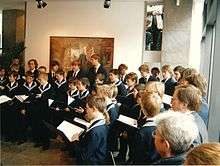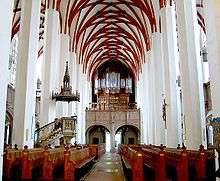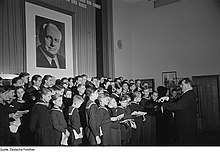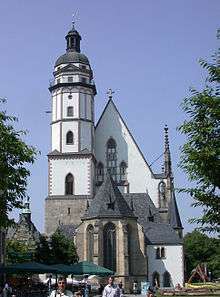Thomanerchor
The Thomanerchor (English: St. Thomas Choir of Leipzig) is a boys' choir in Leipzig, Germany. The choir was founded in 1212. The choir comprises about 90 boys from 9 to 18 years of age. The members, called Thomaner, reside in a boarding school, the Thomasalumnat and attend the Thomasschule zu Leipzig, a Gymnasium school with a linguistic profile and a focus on musical education. The younger members attend the primary school 76. Grundschule in der Manetstraße. Johann Sebastian Bach served as Thomaskantor, director of the choir and church music in Leipzig, from 1723 to 1750.
Thomanerchor | |
|---|---|
 | |
| Background information | |
| Origin | Leipzig, Germany |
| Genres | Choral, classical |
| Occupation(s) | Boys choir |
| Instruments | Boys' and men's voices (SATB) |
| Years active | 1212-present |
| Website | www.thomanerchor.de |
| Past members | |
The choir


Although the choir's main musical field traditionally consists of the vocal works of Johann Sebastian Bach, the repertoire comprises pieces from different eras, from the Renaissance to contemporary music. Gotthold Schwarz is the 17th Thomaskantor since Bach.
The Forum Thomanum is a meeting place in the Bach Quarter of Leipzig. Its construction has already begun and it will be a big musical campus with the Thomasalumnat, Kindergarten, Primary School, High School, Choir, Luther Church, Youth hostel, Administration buildings, gym, a rehearsal hall and more amenities. Some critics contend that the Forum Thomanum project will change the way that the Thomaner are instructed and recruited.
Most of the members of the Thomanerchor live in the Thomasalumnat on Hiller street. The boys are separated in Stuben and not school classes or groups. One Stube is not only a sleeping room, but also an administrative entity with a closed hierarchy and a clear assignment of tasks. There's always an older choir boy with younger ones in each Stube in order to create a hierarchy and didactic relationship. Hence, the education on the Thomanerchor is enforced by the older members and the teachers don't really play a big role. Therefore, it is possible that only 5 teachers look after 90 children. Every year the Stuben are distributed again, the ages of the children are considered for the changes and the possibility to influence the social order on the Stube.
The Stuben have only lockable wardrobes (Köte) and one table for each boy. There are also other furnishings, namely shelves, for books, newspapers and satchels, radios, plants and chairs. Televisions and computers are not allowed and each room has about 10 beds.
The Thomasalumnat also has a gym, a rehearsal hall, and a dining-hall where all boys eat together three times a day, a shop where the tailor sews the boys' suits for the concerts, an archive, a wing of the building for the teachers who live there, a room for the band, a model railway room, a fitness room, a living-room for the older boys, a "press room" for the school's newspaper, a sauna, a library with computers and internet, an infirmary, and a television room. Communal restrooms are located on the hallway of each Stube.
The Thomanerchor gives concerts across Germany (at least two major tours a year) and abroad. The choir also sings three times a week in the Thomaskirche, "Motette" every Friday evening at 6 and every Saturday afternoon at 3, service on Sundays at 9 o'clock. The choir also sings at Protestant festivities. The children have vacations during the summer school vacations.
The tour of 2012, the choir's 800th year, presented a program of Scarlatti's Exultate Deo, Kyrie and Gloria from Palestrina's Missa sine nomine, Bruckner's motets Vexilla regis and Christus factus est pro nobis, and Bach's motet Jesu, meine Freude. It was performed, for example, on 6 July in the Eberbach Abbey at the Rheingau Musik Festival.
History


The Margrave of Meissen founded St. Thomas' priory for Augustinian Canons (Augustiner-Chorherrenstift zu St. Thomas) in 1212. A school was annexed to the monastery, the intended purpose of which was to develop future priests. Since the Reformation in 1539, the school and the choir have belonged to the city of Leipzig; it is also influenced by the Protestant Church of Saxony. This makes the Thomanerchor the oldest cultural entity in the city and one of the oldest in Europe; the Regensburger Domspatzen is the oldest known choir on record.[1] When Johann Sebastian Bach served as director, the choir consisted of about 50 singers, of which the best 16 were used for performance of cantatas.[2] After Bach's death, other famous musicians served as director, among them Doles, Hiller and Moritz Hauptmann.
By the end of the 19th century, the Thomasschule next to the Thomaskirche was demolished and the choir moved to the Hiller street, now the Leipziger "Music Quarter". During the Nazi era, the choir was incorporated into the Hitler Jugend in 1937. But the Nazi government did not succeed in infiltrating their ideology into the choir's repertoire because the then director Ramin concentrated on religious works. He also tried to prevent the boys from being enlisted as long as possible.
Georg Christoph Biller, who was a Thomaner himself in his youth, directed the choir from 1992 to 2015. After retiring for health reasons, he was succeeded by Gotthold Schwarz as interim cantor, the latter being officially appointed as the new Thomaskantor in June 2016.[3]
Cantors
Cantors of the Thomanerchor, called Thomaskantor in German, have included (in brackets their time in the office):
- Georg Rhau (1518–1520)
- Johannes Galliculus (1520–1525)
- Sethus Calvisius (1594–1615)
- Johann Hermann Schein (1615–1630)
- Tobias Michael (1631–1657)
- Sebastian Knüpfer (1657–1676)
- Johann Schelle (1677–1701)
- Johann Kuhnau (1701–1722)
- Johann Sebastian Bach (1723–1750)
- Johann Friedrich Doles (1756–1789)
- Johann Adam Hiller (1789–1801)
- Johann Gottfried Schicht (1810–1823)
- Christian Theodor Weinlig (1823–1842)
- Moritz Hauptmann (1842–1868)
- Ernst Friedrich Richter (1868–1879)
- Wilhelm Rust (1880–1892)
- Gustav Schreck (1893–1918)
- Karl Straube (1918–1939)
- Günther Ramin (1939–1956)
- Kurt Thomas (1957–1960)
- Erhard Mauersberger (1961–1972)
- Hans-Joachim Rotzsch (1972–1991)
- Georg Christoph Biller (1992–2015)
- Gotthold Schwarz (2016–) (acting cantor 2015–2016)
Famous Thomaner
- Carl Philipp Emanuel Bach
- Günther Ramin
- Diethard Hellmann
- Jörg-Peter Weigle
- Die Prinzen
- Hans-Jürgen Beyer (in German)
- Georg Christoph Biller
- Jürgen Golle (in German)
- Reiner Süß (in German)
- Erhard Mauersberger
- Martin Christian Vogel (in German)
- ensemble amarcord
- Christoph Genz
- Hanns-Martin Schneidt
- Matthias Weichert
- David Timm
- Martin Petzold
Films
- Die Thomaner - Ein Tag im Thomas-Alumnat. Documentary film. Germany 1941. Shot, directed and edited by 16-year-old Thomaner choirboy Fritz Spiess
- Die Thomaner. Documentary film. East Germany 1979. Director: Lew Hohmann.
- Das fliegende Klassenzimmer. Literal adaptation of Erich Kästner's novel The Flying Classroom. Germany 2003. Director: Tomy Wigand.
- Paul Gerhardt - der Film. Mit dem Thomanerchor Leipzig. Documentary film. Germany 2007. Director: Gerold Hofmann.
- 800 Years of Thomanerchor. Germany March 25, 2012, MDR Television (YouTube)
- Die Thomaner Documentary film. Germany March 2012. Directors: Paul Smaczny, Günter Atteln.
Awards and recognition
Awards:
- 2011 Bach Prize of the Royal Academy of Music (London)[4]
- 2002 Brahms Prize of the Brahms Society of Schleswig-Holstein (German: Brahms Preis)
- 2002 ECHO Classic Award for Best Choral Performance of the Year (German: ECHO Klassik)
- 2001 European Cultural Award of the European Cultural Foundation
- 1999 BILD-OSGAR Award
- 1994 Grants-in-Aid from the Ernst von Siemens Foundation for Music
- 1985 Osaka Music Prize
State decorations:
- 1987 Fatherland's Order of Merit in Gold, of East Germany (German: Vaterländischer Verdienstorden)
- 1954 Fatherland's Order of Merit in Silver, of East Germany (German: Vaterländischer Verdienstorden)
Eponyms
- 1924 The asteroid 1023 Thomana discovered by Karl Wilhelm Reinmuth was named after the boys' choir
See also
- St. Thomas Church, Leipzig
- Thomasschule zu Leipzig
References
- "Regensburger Domspatzen (Boys Choir) - Short History". www.bach-cantatas.com. Retrieved 21 April 2018.
- Wolff, Christoph (2000). Johann Sebastian Bach : the learned musician (2013 ed.). New York: W.W. Norton. pp. 260, 263. ISBN 0-393-32256-4.
- Zapf, Angelika (11 February 2017). "Thomaskantor Gotthold Schwarz". MDR Kultur (in German). Archived from the original on 5 March 2017. Retrieved 5 March 2017.
- Anon (7 September 2011). "Academy / Kohn Bach Prize winners: Thomanerchor Leipzig". London: Royal Academy of Music. Archived from the original on 2 April 2012. Retrieved 9 September 2011.
Bibliography
- Horst List: Aus der Geschichte des Thomanerchores. Thomanerchor, Leipzig 1953.
- Lenka von Koerber: Wir singen Bach. Der Thomanerchor und seine Kantoren. Urania-Verlag, Berlin 1954.
- Horst List: Auf Konzertreise. Ein Buch von den Reisen des Leipziger Thomanerchores. Reich, Hamburg-Bergstedt 1957.
- Richard Petzoldt: Der Leipziger Thomanerchor. Edition Leipzig, Leipzig 1962.
- Bernhard Knick: St. Thomas zu Leipzig. Schule und Chor. Stätte des Wirkens von Johann Sebastian Bach. Bilder und Dokumente zur Geschichte der Thomasschule und des Thomanerchores mit ihren zeitgeschichtlichen Beziehungen. Mit einer Einführung von Manfred Mezger. Breitkopf & Härtel, Wiesbaden 1963.
- Hans-Jochim Rothe: Thomanerchor zu Leipzig, Deutsche Demokratische Republik. Thomanerchor, Leipzig 1968.
- Horst List: Der Thomanerchor zu Leipzig. Deutscher Verlag für Musik, Leipzig 1975.
- Armin Schneiderheinze: Der Thomanerchor zu Leipzig. Thomanerchor, Leipzig 1982.
- Wolfgang Hanke: Die Thomaner. Union-Verlag, Berlin 1985.
- Stefan Altner, Roland Weise: Thomanerchor Leipzig. Almanach 1. 1996. ISBN 3-9804313-1-2
- Gunter Hempel: Episoden um die Thomaskirche und die Thomaner. Tauchaer Verlag, Taucha 1997. ISBN 3-910074-67-7
- Michael Fuchs: Methoden der Frühdiagnostik des Eintrittszeitpunktes der Mutation bei Knabenstimmen. Untersuchungen bei Sängern des Thomanerchores Leipzig. 1997
- Stefan Altner: Thomanerchor und Thomaskirche. Historisches und Gegenwärtiges in Bildern. Tauchaer Verlag, Taucha 1998. ISBN 3-910074-84-7
- Georg Christoph Biller, Stefan Altner: Thomaneralmanach 4. Beiträge zur Geschichte und Gegenwart des Thomanerchors. Passage-Verlag, Leipzig 2000. ISBN 3-932900-33-2
- Gert Mothes, Siegfried Stadler: Die Thomaner. Passage-Verlag, Leipzig 2004. ISBN 3-932900-91-X
- Stefan Altner: Das Thomaskantorat im 19. Jahrhundert. Bewerber und Kandidaten für das Leipziger Thomaskantorat in den Jahren 1842 bis 1918. Quellenstudien zur Entwicklung des Thomaskantorats und des Thomanerchors vom Wegfall der öffentlichen Singumgänge 1837 bis zur ersten Auslandsreise 1920. Passage-Verlag, Leipzig 2006. ISBN 3-938543-15-9
- Helga Mauersberger (Hrsg.): Dresdner Kreuzchor und Thomanerchor Leipzig. Zwei Kantoren und ihre Zeit. Rudolf und Erhard Mauersberger. Druck- und Verlagsgesellschaft Marienberg, Marienberg 2007. ISBN 978-3-931770-46-4